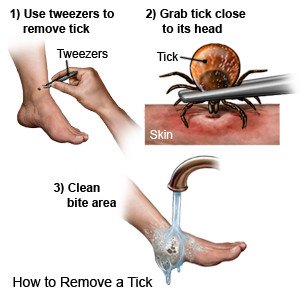Tick Bite
Medically reviewed by Drugs.com. Last updated on Aug 4, 2025.
Ticks need to be removed quickly. Most tick bites are not dangerous, but ticks can pass disease or infection when they bite. Diseases include Lyme disease, babesiosis, tularemia, and Rocky Mountain spotted fever. Signs and symptoms may develop weeks or even months after a bite. Some may happen right away, such as redness, pain, itching, and swelling near the bite area. Watch for a fever, rash, body aches, or breathing problems. These may be symptoms of a serious disease that needs to be treated quickly.
DISCHARGE INSTRUCTIONS:
Return to the emergency department if:
- You have trouble walking or moving your legs.
- You have joint pain, muscle pain, or muscle weakness within 1 month of a tick bite.
- You have a fever, chills, headache, or rash.
Call your doctor if:
- You cannot remove the tick.
- The tick's head is stuck in your skin.
- You have questions or concerns about your condition or care.
Medicines:
- Medicines help decrease pain, redness, itching, and swelling. You may also need medicine to prevent or fight a bacterial infection. These medicines may be given as a cream, lotion, or pill.
- Take your medicine as directed. Contact your healthcare provider if you think your medicine is not helping or if you have side effects. Tell your provider if you are allergic to any medicine. Keep a list of the medicines, vitamins, and herbs you take. Include the amounts, and when and why you take them. Bring the list or the pill bottles to follow-up visits. Carry your medicine list with you in case of an emergency.
Related medications
How to remove a tick:
Remove the tick as soon as possible to help prevent disease or infection. You are less likely to get sick from a tick bite if you remove the tick within 24 hours. Do not use petroleum jelly, nail polish, rubbing alcohol, or heat. These do not work and may be dangerous. Do the following to remove a tick:
- Try a soapy cotton ball first. Soak a cotton ball in liquid soap. Cover the tick with the cotton ball for 30 seconds. The tick may come off with the cotton ball when you pull it away.
- Use tweezers if the soapy cotton ball does not work. Grasp the tick as close to your skin as possible. Pull the tick straight up and out. Do not touch the tick with your bare hands.
- Do not twist or jerk the tick. A sudden move may break off the tick's head or mouth parts. Do not leave any part of the tick in your skin.
- Dispose of the tick carefully. Do not crush or squeeze the tick. A tick's body may be infected with germs. Flush the tick down the toilet.
- Clean the bite area. After the tick is removed, clean the area with rubbing alcohol. Then wash your hands with soap and water.
 |
Apply ice
on your bite for 15 to 20 minutes every hour or as directed. Use an ice pack, or put crushed ice in a plastic bag. Cover it with a towel before you apply it to your skin. Ice helps prevent tissue damage and decreases swelling and pain.
Prevent a tick bite:
Ticks live in areas covered by brush and grass. Outdoor pets can carry ticks inside the house. Ticks can grab onto you or your clothes when you walk by grass or brush. If you go into areas that contain many trees, tall grasses, and underbrush, do the following:
- Keep your skin and hair covered. Wear pants and a long-sleeved shirt. Tuck your pants into your socks or boots. Tuck in your shirt. Wear sleeves that fit close to the skin at your wrists and neck. This will help prevent ticks from crawling through gaps in your clothing and onto your skin. Wear a hat to prevent ticks from getting in your hair.
- Apply insect repellant on your skin. The insect repellant should contain DEET. Do not put insect repellant on skin that is cut, scratched, or irritated. Always use soap and water to wash the insect repellant off as soon as possible. Do not apply insect repellant on your child's face or hands.
- Spray insect repellant onto your clothes. Use permethrin spray. This spray kills ticks that crawl on your clothing. Be sure to spray the tops of your boots, bottom of pant legs, and sleeve cuffs. As soon as possible, wash and dry clothing in hot water and high heat.
- Check your clothing, hair, and skin for ticks. Shower within 2 hours of coming indoors. Carefully check the hairline, armpits, neck, and waist. Check your pets and children for ticks. Remove ticks from pets the same way as you remove them from people.
- Decrease the risk for ticks in your yard. Ticks like to live in shady, moist areas. Mow your lawn regularly to keep the grass short. Trim the grass around birdbaths and fences. Cut branches that are overgrown and take them out of the yard. Clear out leaf piles. Stack firewood in a dry, sunny area.
Follow up with your doctor as directed:
Write down your questions so you remember to ask them during your visits.
© Copyright Merative 2025 Information is for End User's use only and may not be sold, redistributed or otherwise used for commercial purposes.
The above information is an educational aid only. It is not intended as medical advice for individual conditions or treatments. Talk to your doctor, nurse or pharmacist before following any medical regimen to see if it is safe and effective for you.
Further information
Always consult your healthcare provider to ensure the information displayed on this page applies to your personal circumstances.
